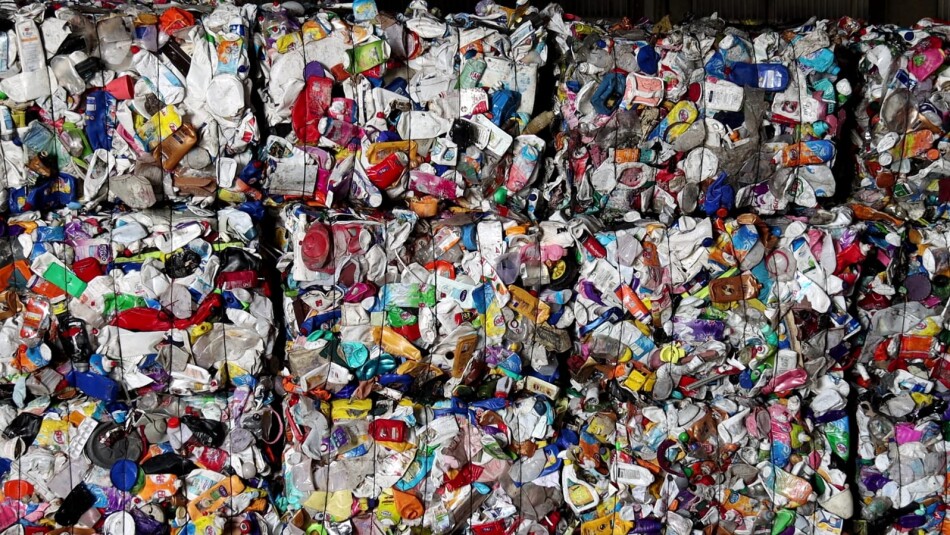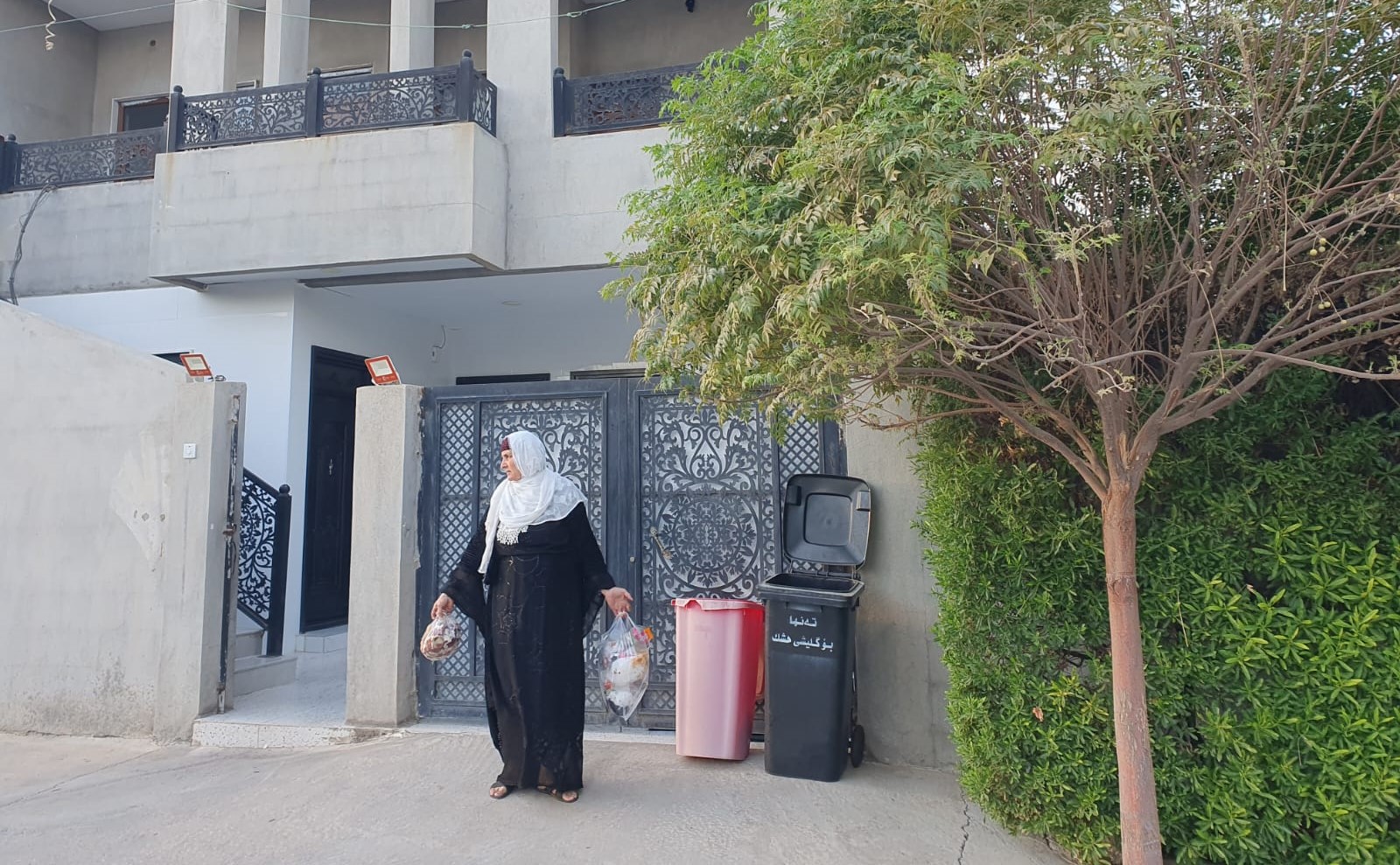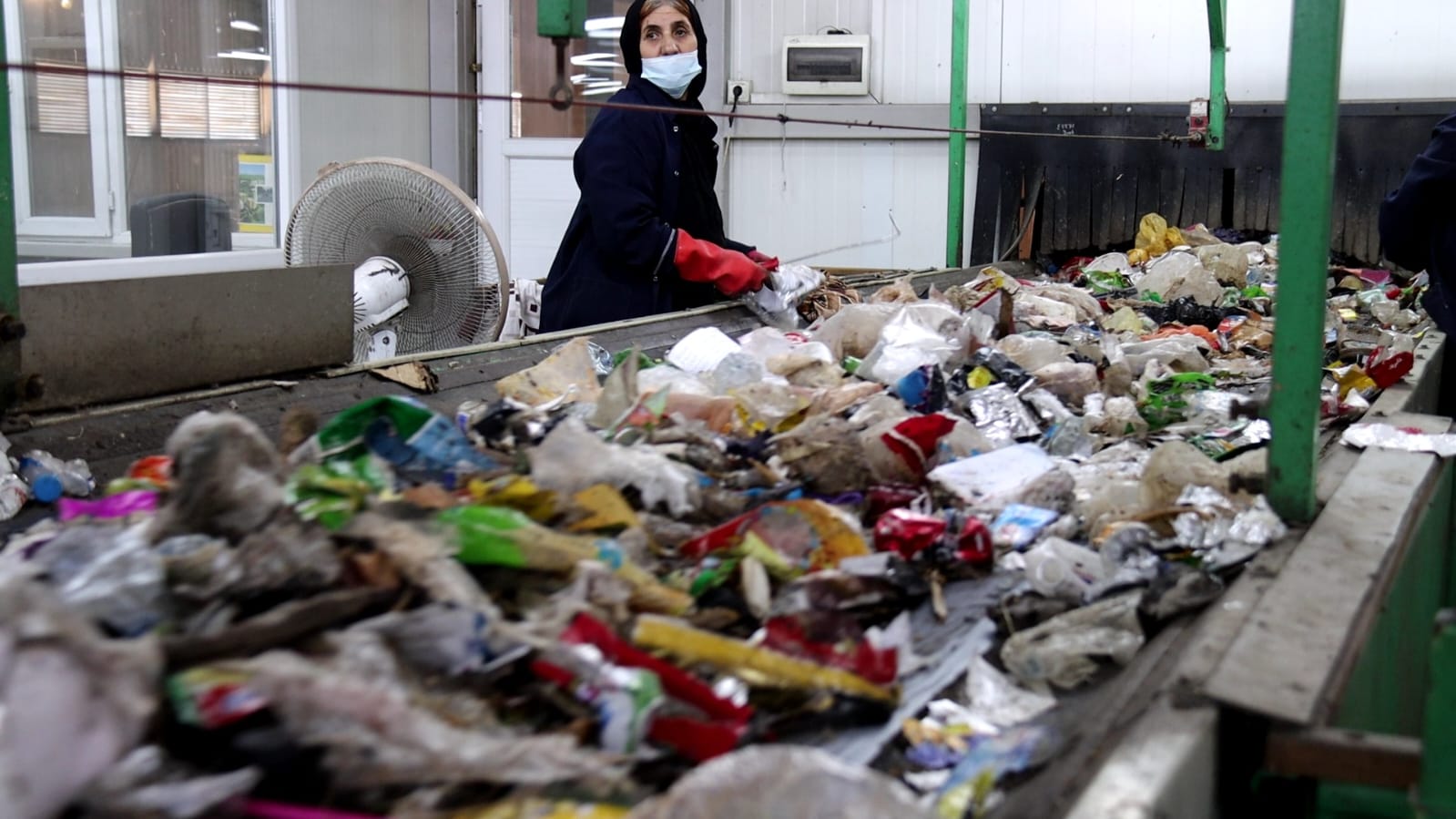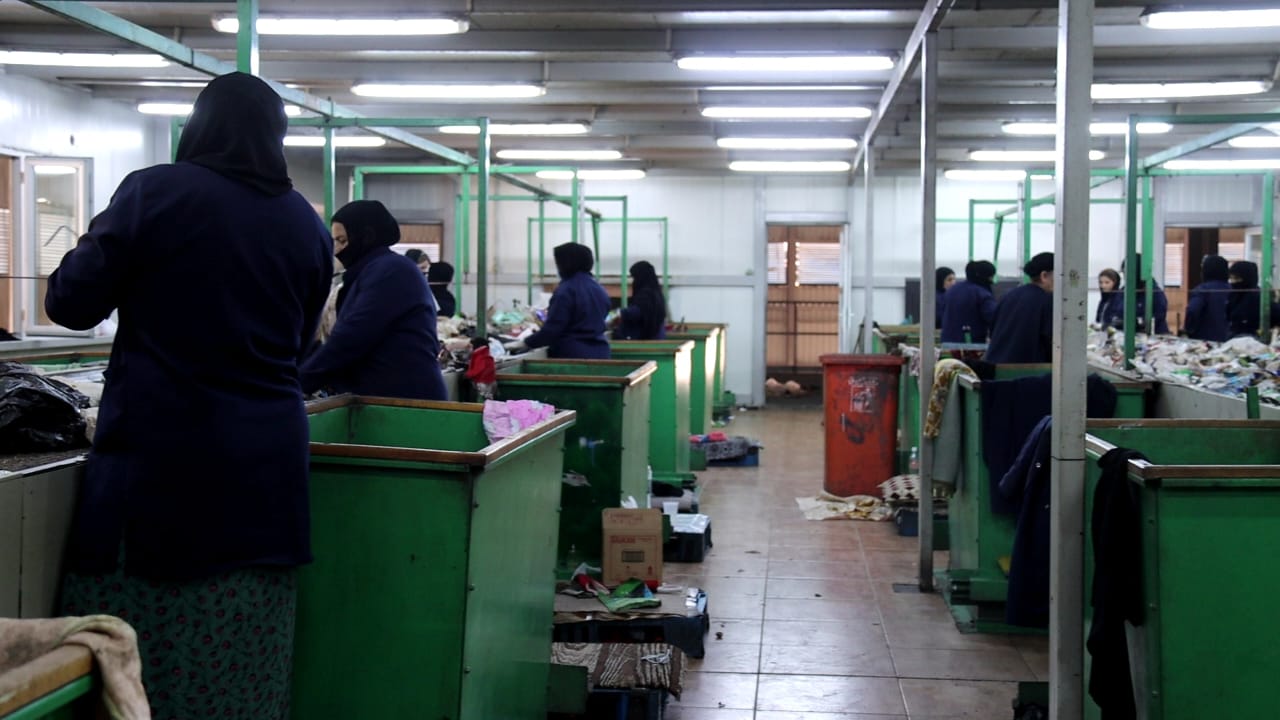
Two waste bins are placed in front of Daya Haji’s house, one is black and big with “solid waste” label, and the other is red and smaller for “food waste”.
Radiya Mahmoud, a woman in her seventies known as “Daya Haji”, appeared in front of her house holding two bags full of waste in her hands and put each one in a basket.
“I felt guilty because I used to throw food waste with glass, plastic baskets, and metal waste together in the waste basket,” Mahmoud says.
For about two years, most residents of the neighborhood where Daya Haji lives in the middle of the Ruvia sub-district in the Shekhan district of Duhok Northern Province have been sorting waste and putting it in different baskets.
"Every day, a special vehicle comes to collect the sorted waste and transports it to its affiliated company for recycling," said Daya Haji, who used to oppose mixing waste and took the initiative to separate food waste and give it as animal feed.
Sorting waste from its source, residential units, is a new initiative in Iraq and has been implemented in the districts of Shekhan, Aqra, and Bardarash in Dohuk Province, becoming a habit that most residents adhere to.
Household waste does not go to waste, but rather goes through several stages of treatment by a large local company with local hands, most of whom are women, and is exported as raw materials abroad, while food waste is converted into fertilizers and fodder that is used domestically.
Daya Haji is optimistic that the waste sorting project by people will expand to include all areas of the Kurdistan Region of Iraq KRI, and says, "Since the initiative was launched, things have become easier for me. I no longer put food waste in refrigerators to collect it later and take it to the village as animal feed."

Daya Haji, a resident of the Ruvya sub-district, separated food waste from plastic and other waste before throwing it away, Dohuk, 2024. Saja Ismail
Solutions from the Source
A local company in Dohuk, as part of a new initiative in cooperation with the people of the town, has allocated different baskets to sort waste daily from houses with the aim of recycling it and combating environmental pollution.
Masoud Mohammed, Director of the (MRF) Waste Investment Company, said, “In the past, it was very difficult to sort household waste, so we thought of returning to the source of the problem and putting the solution inside the homes themselves, so we renewed our contract in this regard and allocated different baskets to sort household waste.”
The company has been collecting waste in the districts of Aqra, Shekhan, and Bardarash since 2011, but introduced the initiative to sort household waste two years ago and allocated 1, 335 billion Iraqi dinars IQD (USD1M) for the project to purchase special containers for sorting waste and distributing them free of charge to people.
“If a person is not corrupt and starts from his home with the mission of protecting the environment, then bigger and better things can be accomplished, so different containers for waste were installed and we are happy with this step. The initiative is economically beneficial and leads to preserving the environment,” according to Omid Jalal (28 years old), a resident of Shekhan district.
The initiative does not include houses only but also restaurants, shops, cafes, and other public places, in addition to mosques and government departments. Each place has been allocated a basket for solid waste such as cardboard, glass, and cans, and they are not mixed with food waste.

A woman sorts nylon at the Waste Investment Company, Duhok/2024. Saja Ismail
Bilind Taher, the director of the Akre (Akre) municipality, says that the project began two years ago and people are cooperating.
"We supervise the process of sorting and collecting waste through 23 committees, and special vehicles have been allocated to collect waste in each sector."
Areas that are not reached by vehicles, such as the (Gostayi Qorave) neighborhood in Aqra, because its alleys are very narrow, collect their waste using four donkeys supervised by a number of staff.
There are 20 municipalities in the districts of Shekhan, Aqra, and Bardarash, in which 23 committees supervise the process of collecting, sorting, and treating waste.
Masoud Mohammed explained that 165 vehicles have been allocated to collect waste daily from different areas in those three districts ad transport it to the factory for complete sorting and treatment.
We separate cardboard, glass, and water bottles from food
200 to 250 tons of waste are collected daily in these districts. "We are fully committed; we separate cardboard, glass, and water bottles from food. This step facilitates our task and the task of the workers who collect the waste, and it is also reused and becomes useful instead of being harmful,” said Shivan Othman, who runs a restaurant in Shekhan.
Over 1,600 tons of waste accumulates daily in the entire Duhok province according to a report by the Kurdistan Region Statistics Authority. A report by the Ministry of Municipalities and Tourism also showed that 6,629 tons of waste is collected daily in the KRI.
Dr. Khunav Hassan, a university professor and environmental expert, expressed her happiness with the waste sorting experience, "The process is in the interest of the environment and leads to preserving the beauty and cleanliness of the environment of those areas. In this way, food waste will not rot and will not turn into toxins that pollute the environment."
In general, food rots after six months of being dumped produces methane gas, which greatly affects the environment. Hassan says that the presence of such initiatives in all other areas will lead to cleaning the environment.

Women make up half of the workers at the Waste Investment Company, Duhok, 2024. Saja Ismail
Everyone Together on the Same Front
Citizens are the basis for the success of the waste sorting initiative implemented in the districts of Aqra, Bardarash, and Shekhan, followed by the company, the recycling plant, and the relevant government agencies.
The tons of waste collected daily are transported directly to the headquarters of the MRF; the company has three recycling machines, one for iron, another for glass waste, and the third for aluminum and other waste.
"The waste of cardboard, nylon, plastic, and similar materials is transported using a conveyor belt to the factory where a group of women sort it and put each type of waste in containers located next to them," the company's director explained.
Mohammed pointed out that part of the waste that has been sorted and cleaned is ground using special machines and then compressed, and part of it is sold to other local companies that recycle part of it, while the rest is sent to Turkey and Iran.
"Half of the profits go to the company, and the other to the municipalities in the three districts," and the company says that this process, in addition to its financial profits, rids the environment of harmful materials.
Fertilizers are produced from food waste
A large part of the waste is not treated inside Iraq, either dumped or burned, which is harmful to the environment. According to statistics from the Ministry of Municipalities and Tourism, during the five years of the ninth ministerial cabinet of the regional government, more than 660 billion IQD were spent to collect, transport, and dump waste.
"The remaining food waste, which constitutes about 65% of the total waste, goes through three stages of treatment and produces fertilizers or animal feed," and the mayor of Aqra, says that the fertilizers and feed produced are subject to tests and studies and go through the procedures of the Ministry of Agriculture, indicating that the municipality plans to allocate a portion of the factory's production to the project of building a shelter for stray dogs.
The food waste separated in the factory is used in several ways, as a portion of it is converted in several stages into organic fertilizers and after examining it, it is sold to farmers, and another portion is converted into animal feed.
Mohammed Adel Barwrai, agricultural specialist at the Ministry of Agriculture, says, "The factory's production is beneficial for the soil and farmers because it is organic," but the process requires mixing some other materials to balance the fertilizers such as nitrogen, phosphorus, and potassium, which are already present in food waste, but the company increases their percentage.
The Duhok administration does not have accurate statistics on the amount of food waste in the governorates' waste, but it is estimated at more than 50%.
Mohammed Majeed, the Director of Veterinary Medicine in Bardarash District, says that after the food waste is dried and ground with special devices, some materials are mixed with it to convert it into fodder, provided that it contains a good percentage of vitamins, protein, and carbohydrates.
"The company is committed to these procedures in producing fodder from food waste."
Investing in solid and food waste is one of the ways to confront environmental pollution, as Iraq is ranked fifth among the countries most affected by the repercussions of climate change.
Nonstop Awareness Campiagns
The most important challenges facing the project are citizens' continued sorting of waste; this obstacle has been overcome a great deal through awareness campaigns leading to the imposition of financial fines on violators.
Masoud Mohammed says that during the past two years, all citizens have been urged to commit to sorting waste, noting that the level of commitment was initially weak but now up to 60%.
The relevant authorities decided, through issuing some instructions and procedures, to impose financial fines on citizens who do not commit to sorting waste. The director of the Aqrah municipality says that "the cooperation of citizens was not 100% at the beginning of the project, but we worked through social media networks, clerics, and awareness campaigns organized by the municipality to urge the public to follow sorting waste in those areas became mandatory."
In addition to raising the level of people obligation, monitoring the company's work is another challenge, as there must be constant supervision, with regard to fertilizer and feed products that must be subject to continuous inspection to avoid harming agriculture and livestock.
Women's Participation and Improving Production
The process of sorting waste and using its products has generated job opportunities and provided facilities for the locals, especially women who constitute more than half of the workforce.
Waste sorting in these areas has become compulsory and must be adhered to
"We are 55 women working here, and we have named the factory the second home for the 55 sisters," says Avan Jalil (44 years old) who has been working in this factory for 8 years and contributes through it to secure an income for her family.
The women wear special clothes and masks during work and sterilize themselves after finishing work to avoid contracting some diseases. Each one of them is assigned a task, one sorts the cardboard and the other only plastic containers.
Work starts at 9 am and ends at 4 pm with a monthly salary of 400,000 IQD.
Sozran Kamran (38 years old) has been working there for four years, and her husband is a waste transport vehicle driver. She says that there is no work that is difficult for women. They also contribute to confronting environmental pollution through their work, which also provides them with a source of livelihood.
The population of the three districts included in the initiative is over 544,000 people, according to estimates by the KRG Statistics Authority. Agriculture and livestock are considered the main sources of income for the population.
"Livestock farmers get the feed produced by the factory for a small amount, and that is good for us," said Ayyub Shiwan, who has been buying the factory's products for some time.
The village of Ismawa in the Bardarash district has 700 families, 80% of whom are involved in agriculture and livestock breeding.
Latif Shaker, 64-years-old farmer, said the fertilizers produced by the factory are safe. "We buy fertilizers from them at lower prices. The fertilizer is natural and does not affect the taste and quality of my crops. It is safe and with no trouble."